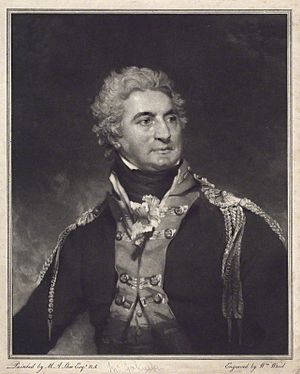John Henry Johnstone facts for kids
John Henry Johnstone (1749–1828) was a famous Irish actor, comedian, and singer. People often called him 'Jack' Johnstone or 'Irish' Johnstone. He was known for his amazing tenor voice and his ability to play Irish characters on stage.
Contents
Early Life and First Steps in Acting
John Henry Johnstone was likely born on August 1, 1749. His birthplace was in the horse-barracks in Kilkenny, Ireland. His father was a quartermaster in a cavalry regiment, which is a type of army unit.
Johnstone himself joined a cavalry regiment when he was young. He quickly became known among his fellow soldiers for his beautiful tenor singing voice. It's said that when he left the army, his colonel wrote a letter to Thomas Ryder, who managed the Smock Alley Theatre in Dublin. The letter recommended Johnstone for his singing talent.
Around 1773, Johnstone made his first appearance on stage at the Smock Alley Theatre. He played the character Lionel in a play called Lionel and Clarissa. He signed a contract for three years but ended up staying on the Irish stage for about seven to ten years. During this time, he sang the main tenor parts in many shows.
Becoming a Star in London
A famous actor named Charles Macklin recommended Johnstone and his wife to Thomas Harris. Harris was the manager of the Covent Garden Theatre in London. Johnstone was hired for three years and made his London debut on October 2, 1783, again playing Lionel. The audience loved him!
Performing in William Shield's Operas
Johnstone often performed in operas created by the composer William Shield.
- In 1783, he played Dermott in The Poor Soldier.
- In 1784, he sang in Shield's Robin Hood. His duet with Charles Bannister was so good that the audience asked for it to be sung again!
- Later that year, he had great success singing "Let fame sound the trumpet" in Shield's Fontainblau.
- He continued to appear in many of Shield's works, often alongside other famous actors like John Quick and Charles Bannister.
- In 1791, he played Captain O'Donnel in The Woodman. People said he performed with "great life and energy" and sang his Irish song "with special skill."
In 1793, Johnstone, William Shield, and other musicians formed a group called 'The Glee Club'. They met regularly to sing and dine together.
Working with Samuel Arnold and Other Composers
Johnstone also worked with the composer Samuel Arnold.
- In 1789, he performed in Inkle and Yarico.
- He was Harry Furnace in Warner's The Armourer in 1793.
- In 1794, he played Captain O'Leary in William Reeve's British Fortitude and Hibernian Friendship.
- He was O'Curragh in Arnold's Zorinski (1795) and Captain Macgallaher in his Bannian Day (1796).
- In 1797, he played Pat Plunket in Britain's Brave Tars!, a short play by Thomas Attwood.
- He remained at Covent Garden until 1803, sometimes performing at the Haymarket Theatre during the summer.
Johnstone played Macheath in the famous Beggar's Opera. He even once played the female role of Lucy in a special production where male and female parts were switched! Over time, his singing voice became less strong, so he started to take on fewer opera roles.
Johnstone became especially good at playing Irish characters in funny plays and operas. Charles Macklin encouraged him to play Sir Callaghan O'Brallachan in Love à-la-Mode. This role was a big moment for him. People loved his perfect Irish accent, his funny acting, and his pleasant singing voice. He was also handsome and had a confident, military way of moving.
He was excellent in roles like:
- Sir Lucius O'Trigger in The Rivals
- Major O'Flaherty in The West Indian
- Dennis Brulgruddery in John Bull
- Looney Mactwolter in The Review
- Teague in The Committee
Because of these roles, he became known as "Irish" Johnstone. When he visited Dublin in 1803, people welcomed him as a true representative of Irish people on stage.
Moving to Drury Lane Theatre
In 1803, Johnstone joined a protest against new rules at Covent Garden Theatre. He then accepted a job at the Drury Lane Theatre. There, he often performed with John Bannister.
- His first performance at Drury Lane was on September 20, 1803, as Murtoch Delany in Irishman in London.
- He also played Sergeant Armagh in The Wife of Two Husbands and Brian O'Bradleigh in Hearts of Oak.
- He acted at Drury Lane for the rest of his career. He did return to Covent Garden a couple of times, including in 1814 and 1820, to play Sir Callaghan.
Later Years and Retirement
Johnstone's last performance at Covent Garden was on June 28, 1820, where he played Brulgruddery. He said goodbye to the stage in Liverpool in August of that year. However, he made one more appearance at a charity show at Drury Lane on May 18, 1822.
John Henry Johnstone passed away at his home in London on December 26, 1828. He was buried in a vault at St. Paul's Church, Covent Garden.
Family Life
Johnstone married twice. His first wife was Ann Maria, who was the daughter of Colonel Poitier. She was an opera singer and taught him music.
His second wife was Ann Bolton. They had one daughter, Susan Johnstone, who also became an actress. Susan married James William Wallack. Johnstone left most of his money (about £12,000) to his daughter's children. Susan's oldest son was John Johnstone Wallack.
Images for kids
 | Kyle Baker |
 | Joseph Yoakum |
 | Laura Wheeler Waring |
 | Henry Ossawa Tanner |



